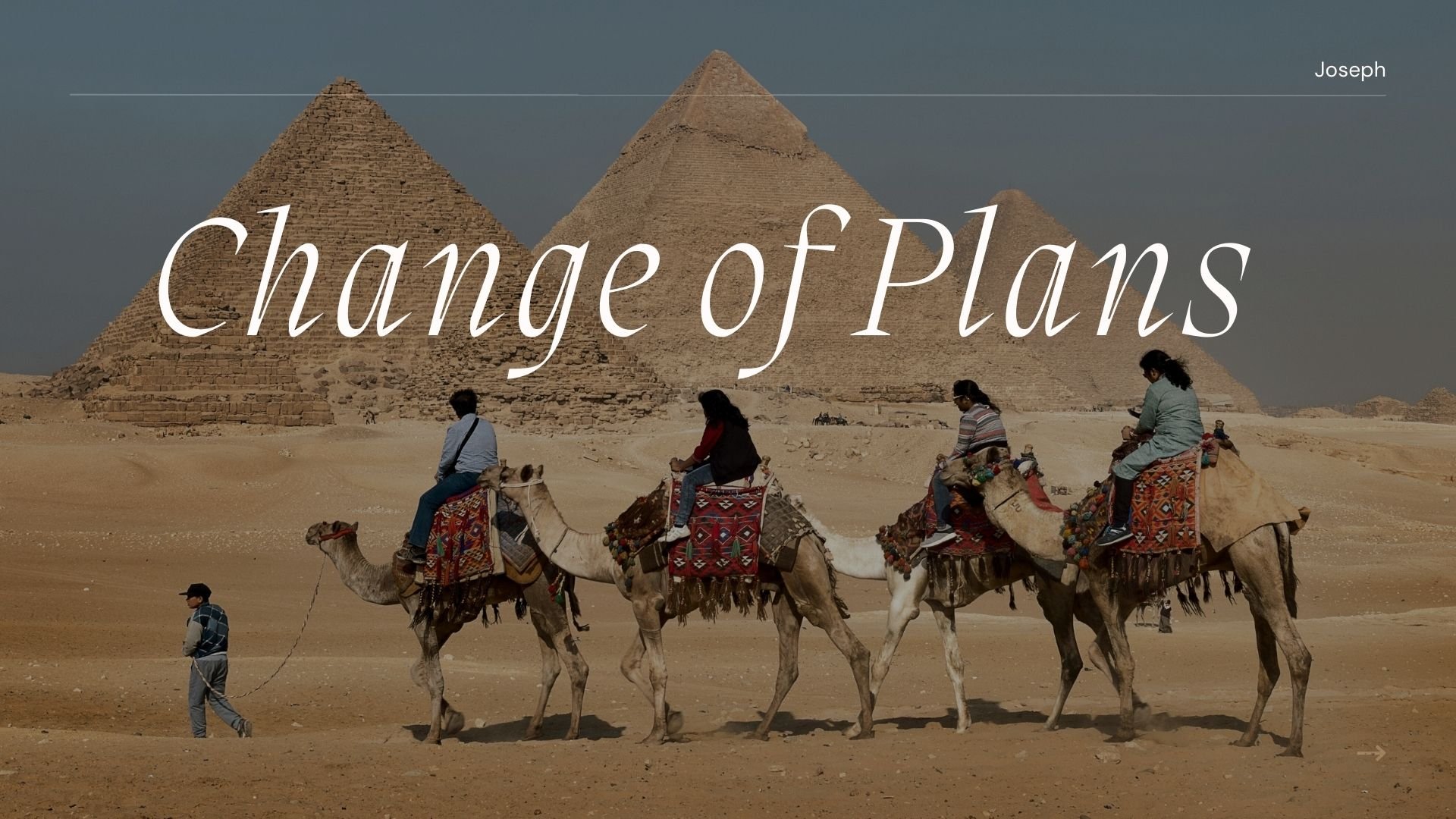A Dream Come True
This post is part of my series on the life of Joseph.
Looking at one another
When Jacob saw that there was grain in Egypt, Jacob said to his sons, “Why do you look at one another?”
- Genesis 42:1 NKJV
Genesis 42 picks up where Genesis 41 left off.
56 The famine was over all the face of the earth, and Joseph opened all the storehouses and sold to the Egyptians. And the famine became severe in the land of Egypt. 57 So all countries came to Joseph in Egypt to buy grain, because the famine was severe in all lands.
- Genesis 41:56-57 NKJV
The famine was not limited to Egypt, and God was using Joseph to save many lives. Joseph’s elevated position was not simply a reward for Joseph because he had been obedient, it was a responsibility to be a blessing to those impacted by the famine. (See Genesis 45:7,27; 50:20)
Jacob becomes aware that there is grain and in a very fatherly and caring way asks his sons, “Why are you standing around staring at each other for? You are all grown men, do I have to spell everything out for you? What will you do when I am dead and gone? Can’t you take the initiative on your own? When I was your age I was out and living on my own without anyone having to tell me what to do…”
Okay, maybe I added a few extra lines but I got the Idea that Jaco was not too impressed with the performance of his boys. On a more serious note, this verse does demonstrate that Jacob is very much the patriarch and in charge of his household. Things are not done without his say-so.
A matter of life or death
2 And he said, “Indeed I have heard that there is grain in Egypt; go down to that place and buy for us there, that we may live and not die.”
- Genesis 42:2 NKJV
Jacob is not sending his sons on vacation. The children of Israel are not going to Egypt to study the local architecture. They are going to Egypt because unless they purchase grain they will die. The situation is dire and there are no other options.
10 brothers?
3 So Joseph’s ten brothers went down to buy grain in Egypt. 4 But Jacob did not send Joseph’s brother Benjamin with his brothers, for he said, “Lest some calamity befall him.” 5 And the sons of Israel went to buy grain among those who journeyed, for the famine was in the land of Canaan.
6 Now Joseph was governor over the land; and it was he who sold to all the people of the land. And Joseph’s brothers came and bowed down before him with their faces to the earth.
- Genesis 42:3-6 NKJV
The sons of Jacob, or the children of Israel are identified as Joseph’s brothers. In this story, the important factor is not so much the relationship of the (grown) children to their father but rather their relationship to Joseph, their brother. What will have the greatest impact in this story is how the brothers relate to their brother and how their brother Joseph will relate to them.
The mention of 10 brothers demonstrates the threat to the children of Israel. We know that there are 12 tribes of Israel. But because of favoritism, jealousy, deceit, and fear, there are only 10 brothers traveling. The children of Israel are threatened by the recent turn of events. As we will witness there is guilt and lack of trust. Dishonesty and jealousy can ruin any family. As the family collapses the world suffers.
The text reminds us that Joseph was governor over the land and was in charge of selling the grain. Joseph’s brothers bow down with their faces to the earth when they approach him, having no idea they are bowing down to their younger brother.
A Dream Fulfilled
7 Joseph saw his brothers and recognized them, but he acted as a stranger to them and spoke roughly to them. Then he said to them, “Where do you come from?”
And they said, “From the land of Canaan to buy food.”
8 So Joseph recognized his brothers, but they did not recognize him. 9 Then Joseph remembered the dreams which he had dreamed about them, and said to them, “You are spies! You have come to see the nakedness of the land!”
- Genesis 42:7-9 NKJV
Joseph recognizes his brothers and remembers the dream he had as a child (Genesis 37:5-8 I have a whole blog on this entitled Dysfunctional Family)
7 There we were, binding sheaves in the field. Then behold, my sheaf arose and also stood upright; and indeed your sheaves stood all around and bowed down to my sheaf.”
8 And his brothers said to him, “Shall you indeed reign over us? Or shall you indeed have dominion over us?” So they hated him even more for his dreams and for his words.
- Genesis 37:7-8 NKJV
This dream had just been fulfilled. Joseph’s brothers were there bowing down to him and he remembered the dream. But he did not let them know who he was. There are several reasons as to why his brothers did not recognize Joseph. He had been younger and therefore changed more over the past few years. Because of his position of authority over all of Egypt and the sale of the grain, they would not have expected their little brother to have such a position. Also, Joseph is dressed in Egyptian style and like has his head shaved (Genesis 41:14).
Joseph speaks harshly to them. After all, they had thrown him down a pit and sold him as a slave. Joseph had suffered for over a decade because of his brothers. Accusing them of being spies makes sense. Canaan/Syria and Egypt often experienced tense relations and hungry armies make for dangerous and desperate enemies. (Andrews University. Andrews Study Bible: Light. Depth. Truth. Berrien Springs, Mi, Andrews University Press, 2010. p59).
Oversharing
12 But he said to them, “No, but you have come to see the nakedness of the land.”
13 And they said, “Your servants are twelve brothers, the sons of one man in the land of Canaan; and in fact, the youngest is with our father today, and one is no more.”
- Genesis 42:12-13 NKJV
Joseph sticks to his accusation that his brothers are spies who came to see the “exposed parts” of the land. The brothers, understandably, become very scared and begin to share details about their family trying to convince this Egyptian officer (Joseph) that they are not spies. As they share Joseph learns that his father is alive and so is his brother Benjamin.
Prison Time
14 But Joseph said to them, “It is as I spoke to you, saying, ‘You are spies!’ 15 In this manner you shall be tested: By the life of Pharaoh, you shall not leave this place unless your youngest brother comes here. 16 Send one of you, and let him bring your brother; and you shall be kept in prison, that your words may be tested to see whether there is any truth in you; or else, by the life of Pharaoh, surely you are spies!” 17 So he put them all together in prison three days.
- Genesis 42:14-17 NKJV
Joseph decides to keep all his brothers in prison and allow one to go and get the younger brother to prove that they are not spies and that their story is true. Joseph placed his 10 brothers in prison for three days. Three days is a significant period of time in the Bible. The third day often describes a decisive moment in biblical stories. (Genesis 22:4; 31:22; 34:25; Exodus 19:11; Judges 20:30; Esther 5:1; Jonah 1:17; Matthew 16:21; Mark 9:31; Luke 9:22; etc.)
Joseph gives his brothers three days to fight and argue over who will get to go get their younger brother and break the terrible news to their father. We are not told of anyone volunteering or any details regarding the three days the brothers spend in prison. Joseph’s test accomplishes several tasks at once. First, it reveals if his brothers are being honest regarding their father and younger brother. Second, the test guarantees the safety of his brother Benjamin. The brothers must bring Benjamin safely otherwise they will all suffer greatly. Third, the test causes the brothers to reflect on their past behavior and change. Fourth, the test reveals the current condition of their hearts.
Change of Plans
18 Then Joseph said to them the third day, “Do this and live, for I fear God: 19 If you are honest men, let one of your brothers be confined to your prison house; but you, go and carry grain for the famine of your houses. 20 And bring your youngest brother to me; so your words will be verified, and you shall not die.”
And they did so.
- Genesis 42:18-20 NKJV
Joseph changes his mind after three days and asks for one brother to stay. Once again we are not given details but it could be that God is also working on Joseph’s heart and a healing process is taking place. Perhaps Joseph’s heart was softened. Maybe Joseph considered the danger of one brother traveling alone and how this might actually place Benjamin’s life in danger. Also, what about his father and Benjamin and the entire household? They need food. Joseph does not want his family to have to suffer because of the wickedness his brothers performed all those years ago.
There is debate among biblical scholars regarding Joseph’s statement that he fears God.
Commentators dispute the precise intention of this phrase by Joseph. The expressions “fear God” and “fear the Lord” describe someone who worships the Lord (e.g., Deut 25:18; Josh 22:25; 1 Kgs 18:3; Eccl 12:13), but here the expression probably is equivalent to “a God-fearer” (yirʾat ʾĕlōhîm), referring to a person’s moral conduct (cf. comments on 20:11; 22:12). This is someone who does not oppress a weaker person (e.g., Lev 19:14; Deut 25:18). Also this description by Joseph occurs for those outside the community of Israel (e.g., Job 1:1, 8–9). Yet the author of chaps. 42–44 constructs much of what is said and done between Joseph and the brothers to convey a double meaning. The implication one might draw from Joseph’s protestation is that he was a person of integrity and the brothers were not. That the brothers immediately acknowledged their sin suggests strongly that they recognized the deeper meaning of his challenge to their integrity. From their perspective, the Egyptian lord presumably did not know their family secret, but in the ears of their conscience his words were the judgment of God against them. Moreover, by his assertion “I fear God,” another implication was that even this foreign lord acted with more fidelity than they had toward their own family.
- K. A. Mathews, Genesis 11:27–50:26, vol. 1B, The New American Commentary (Nashville: Broadman & Holman Publishers, 2005), 779–780.
Guilty Conscience
21 Then they said to one another, “We are truly guilty concerning our brother, for we saw the anguish of his soul when he pleaded with us, and we would not hear; therefore this distress has come upon us.”
22 And Reuben answered them, saying, “Did I not speak to you, saying, ‘Do not sin against the boy’; and you would not listen? Therefore behold, his blood is now required of us.” 23 But they did not know that Joseph understood them, for he spoke to them through an interpreter. 24 And he turned himself away from them and wept. Then he returned to them again, and talked with them. And he took Simeon from them and bound him before their eyes.
- Genesis 42:21-24 NKJV
Joseph’s brothers talk among themselves and we catch a glimpse of their remorse. The passage of time had done nothing to diminish their guilt. Based on their exchange I wonder how many times they wished they could have gone back and done things differently. I imagine sleepless nights and profound sadness for extended periods of time and the entire household mourned the death of Joseph. Joseph learns of this along with us (the readers). He realizes the brothers still struggle with their terrible behavior, they recognize their guilt, and they have also been suffering. They were not sold as slaves but they had to witness their father going through depression, their dreams were likely haunted by memories of Joseph begging them to release him.
This reminds us that giving in to sin always causes much suffering all around. Being mean to someone never feels good in the long run. Lying and cheating never lead to joy.
Brief excursus
This may sound awful, but let me know if you agree or disagree with this thought,
Sometimes it is better to be the victim than the perpetrator of a sin.
It is awful to be on the receiving end of a wrongdoing, but your conscience is clean. Others may lie about you and persecute you as you do your absolute best to do the right thing and follow God. My approach to life is to do my very best, to do the right thing, the honest thing, the kind thing, or at least that is what I aim at. And what goes beyond that I leave up to God. Everyone else can be cheating and mean but it does not mean that that is the only approach or the best approach. I want to strive to be kind and honest even if it feels like a losing battle.
Think about this with me. We all agree that it is not good to be sold as a slave or to sell someone as a slave. But would you rather be in Joseph’s shoes or his brothers? Joseph had an incredibly difficult life, but God was with him every step of the way. His brothers got to go back home, but because of their grave sin they not only caused great suffering, they also suffered. The brothers suffered while missing out on the peace that surpasses all understanding (Philippians 4:7). Joseph also suffered, but he knew that God was with him. Let me know your thoughts on this in the comments section below.
Joseph then takes Simeon from the 10 brothers and binds him in front of them. Although the text permits that he commanded others to bind Simeon, it also naturally reads that Joseph himself tied up his brother. (K. A. Mathews, p781)
Why Simeon?
The biblical text is not clear on the reason for Simeno being chosen, but I came across a couple of helpful opinions on this matter.
Why Simeon? He likely played a predominant role in the plot to kill Joseph. Simeon was also the toughest and cruelest of the brothers, as indicated in the Dinah incident (Gen.34:25, 30). In choosing Simeon, Joseph signified his power over all his brothers. Even if Simeon was able to stand up to his father (Gen.34:30-31), he could not stand before Joseph, who thus revealed himself as even more powerful than his father, again, a hint at his dream (Gen.37:10).
- Doukhan, Jacques. Genesis. Nampa, Idaho, Pacific Press Publishing Association ; (Hagerstown, Maryland, 2016), 455.Simeon was born by Leah, her second son after Reuben. After overhearing that Reuben came to Joseph’s defense (v. 22), Joseph may have passed over him, taking the second son in line (29:33). Moreover, there may have been a greater temptation to abandon Simeon by the others, presuming that Jacob would be less agitated about his detention, since Simeon had infuriated their father in the past (34:30; 49:5–7). A rabbinic tradition (e.g., Tg. Ps.-J.) assigned to Simeon more guilt for the conspiracy to kill Joseph (37:18–19, “they said to one another”), noting Simeon and Levi had conspired to slaughter the Shechemites (so Rashi; 34:13, 25).
- K. A. Mathews, Genesis 11:27–50:26, vol. 1B, The New American Commentary (Nashville: Broadman & Holman Publishers, 2005), 781.
This situation placed the brothers in a similar spot that they had faced with young Joseph. Once they had the food for which they came, they could return and lie again to their father, leaving their brother to languish in prison. If the brothers are unrepentant, they can simply repeat similar lies regarding their brother Simeon. Joseph, however, knows something his brothers do not know. He knows the famine will last a total of 7 years. He knows there’s a very good chance, perhaps a certainty that his brothers will be back needing to buy more food.
The Brothers Return to Canaan
25 Then Joseph gave a command to fill their sacks with grain, to restore every man’s money to his sack, and to give them provisions for the journey. Thus he did for them. 26 So they loaded their donkeys with the grain and departed from there. 27 But as one of them opened his sack to give his donkey feed at the encampment, he saw his money; and there it was, in the mouth of his sack. 28 So he said to his brothers, “My money has been restored, and there it is, in my sack!” Then their hearts failed them and they were afraid, saying to one another, “What is this that God has done to us?”
29 Then they went to Jacob their father in the land of Canaan and told him all that had happened to them, saying: 30 “The man who is lord of the land spoke roughly to us, and took us for spies of the country. 31 But we said to him, ‘We are honest men; we are not spies. 32 We are twelve brothers, sons of our father; one is no more, and the youngest is with our father this day in the land of Canaan.’ 33 Then the man, the lord of the country, said to us, ‘By this I will know that you are honest men: Leave one of your brothers here with me, take food for the famine of your households, and be gone. 34 And bring your youngest brother to me; so I shall know that you are not spies, but that you are honest men. I will grant your brother to you, and you may trade in the land.’ ”
35 Then it happened as they emptied their sacks, that surprisingly each man’s bundle of money was in his sack; and when they and their father saw the bundles of money, they were afraid. 36 And Jacob their father said to them, “You have bereaved me: Joseph is no more, Simeon is no more, and you want to take Benjamin. All these things are against me.”
37 Then Reuben spoke to his father, saying, “Kill my two sons if I do not bring him back to you; put him in my hands, and I will bring him back to you.”
38 But he said, “My son shall not go down with you, for his brother is dead, and he is left alone. If any calamity should befall him along the way in which you go, then you would bring down my gray hair with sorrow to the grave.”
- Genesis 42:25-38 NKJV
Because of their heavy conscience and past sins, the brothers had a terrible experience even though they were able to secure life-saving food. Even the blessings they experience, such as having their money restored only cause them to experience more stress, fear, and anxiety. Joseph’s brothers exclaim, “What is this that God has done to us?” meaning that even blessings are interpreted as judgment from God. They feel guilty and are just expecting to be judged at any moment and interpret their struggles as God’s righteous judgment on them for their past sins.
The brothers also have to once again experience the anguish of their father Jacob. Jacob who had lied to his father and brother and was forced to flee his father’s home (Thy Will be Done?, and The Gate of Heaven) now experiences the other end of the trial of leaving home and that is remaining home and missing the family members who are absent. Once again we witness the pain and suffering that sin causes. Dishonest gain does not lead to joy and you never know how many people will be affected by the pain it causes. Future generations may struggle as a result of a cherished sin.
Jacob has made up his mind that Benjamin will not go with his other sons to Egypt. He is willing to give up Simeon as lost and he would rather not lose Benjamin as well. He was hoping the famine would end soon. But the famine will not end any time soon.
Recap
Joseph was the victim, he was faithful and obedient but suffered incredible injustices for years being punished despite being honest and doing his very best in everything. It is incredible that he remained faithful to God for as long as he did.
Joseph’s brothers are the villains in the story. They threw Joseph into a pit and refused to help him when he begged them to have mercy on him. They sold him as a slave (see Betrayed by Family). Because of them, Joseph had to grow up a slave (see But God Was With Him) and though he was honest and upright as a slave he was thrown in prison and stayed there for years. (see Wrongfully Accused and Dreams)
We now find out that Joseph’s brothers have been living with incredible guilt and in constant anticipation of God’s judgment for their sins. Jacob who has received his father and brother now suffers because of his sons’ deception. God was saving Jacob’s family and that portion of the ancient world through Joseph, but because of sin and lies the path to this blessing has been filled with suffering.
Takeaway
For I know the thoughts that I think toward you, says the Lord, thoughts of peace and not of evil, to give you a future and a hope.
- Jeremiah 29:11 NKJV
God has a plan for good, but how often do our dishonesty, our mean spirit, and our jealousy add unnecessary pain and suffering?
People like to shake their fists at heaven and ask “Why God?” We wonder why God allows suffering. What if God asked us why we choose to cause suffering? Why do we yell? Why are we dishonest? Why are we violent? Why do we cheat? Why do we choose to profit off of the suffering of our neighbor?
Why did Joseph’s brothers want to kill him? Why did they sell him as a slave? Why did they lie to their father? Why did Potiphar’s wife lie about Joseph?
Do you know what stops the cycle of pain and suffering? It is not a what, but rather a who. Joseph could have had his brothers killed or left in prison for as many years as he had been in prison. He could have made his brothers his slaves. Joseph could have had Potiphar thrown in prison and made Potiphar’s wife one of his slaves. Joseph could have had the Pharaoh’s butler thrown in prison for two years so he could experience what Joseph experienced when he forgot about him for two years.
There is no record of Joseph taking revenge on anyone in Egypt, and though he is not super nice to his brothers he is not as mean as he could have been. He sends them home with food and returns all their money. Joseph decides to stop the cycle of abuse and suffering and to choose a different path.
The cycle of violence and abuse stops with us when we choose to not take out our pain and suffering on others. When you choose to love your spouse. When you choose to be present for your children. When you choose not to marry someone that you’re not willing to die for. When you choose to not take advantage of those who are vulnerable. When you choose to stand up for what is right and to help those who are in need. When you choose to volunteer and be a part of what is good in your circle of influence.
You may be unable to stop all the wars taking place around the world, but you control how you treat those around you. Just because you could pay back evil for evil it does not mean that you should.
17 Do not repay anyone evil for evil. Be careful to do what is right in the eyes of everyone. 18 If it is possible, as far as it depends on you, live at peace with everyone. 19 Do not take revenge, my dear friends, but leave room for God’s wrath, for it is written: “It is mine to avenge; I will repay,”says the Lord. 20 On the contrary:
“If your enemy is hungry, feed him;
if he is thirsty, give him something to drink.
In doing this, you will heap burning coals on his head.”21 Do not be overcome by evil, but overcome evil with good.
Romans 12:17-21 NIV


















